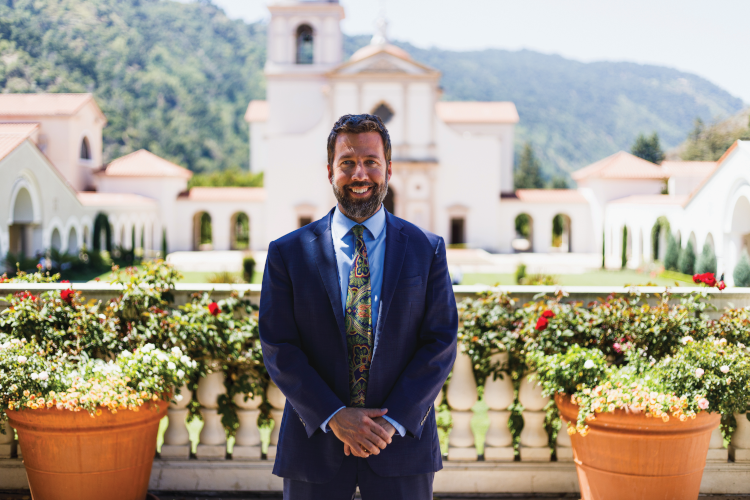- Home
-
About
 Fidelity & Excellence
Fidelity & ExcellenceThomas Aquinas College is unique among American colleges and universities, offering a faithfully Catholic education comprised entirely of the Great Books and classroom discussions.
-
A Liberating Education
 Truth Matters
Truth MattersTruth, and nothing less, sets men free; and because truth is both natural and supernatural, the College’s curriculum aims at both natural and divine wisdom.
-
A Catholic Life
 Under the Light of Faith
Under the Light of FaithThe intellectual tradition and moral teachings of the Catholic Church infuse the whole life of Thomas Aquinas College, illuminating the curriculum and the community alike.
-
Admission & Aid
 Is TAC Right for You?
Is TAC Right for You?Do you enjoy grappling with complex questions? Are you willing to engage in discussions about difficult concepts, with the truth as your ultimate goal?
-
Students & Parents
 Mind, Body & Spirit
Mind, Body & SpiritThere is always something to do at TAC — something worthwhile, something fulfilling, and something geared toward ever-greater spiritual and intellectual growth.
-
Alumni & Careers
 What Can You Do with a Liberal Education?
What Can You Do with a Liberal Education?Nothing speaks more to the versatility of the College’s academic program than the good that our alumni are doing throughout the Church and the world.
- Search
- Giving
Dr. John Finley (’99) Discusses the Nature of Man & Woman at Fall Conferences

Thomas Aquinas College alumnus and tutor Dr. John Finley (’99) spoke on the timely and contentious topic of the nature of man and woman at two conferences last fall — one at Franciscan University in Steubenville, Ohio, and the other at the American Catholic Philosophical Association’s (ACPA) 2024 Annual Meeting, which he helped to organize.
When Dr. Mary Catherine Sommers, philosophy professor for the University of St. Thomas and head of the ACPA, read a 2015 article by Dr. Finley on the metaphysical view of the human being as male or female, she knew she wanted him to assist her with the ACPA’s 2024 meeting. Themed “Male and Female He Created Them,” the conference tackled the philosophical conversation on gender and brought together scholars from around the country.
“When we speak of male and female, we’re talking about fundamental capacities we possess as human beings composed of body and soul, as well as the role of the species to propagate itself and express love.”
After looking over the papers submitted for the conference, Dr. Finley put together a panel of speakers to take a more focused look at what it means to be man or woman from the standpoints of science, medicine, and philosophy. He worked alongside Dr. Paul Hruz, M.D., a pediatric endocrinologist, and maternal-fetal specialist Dr. Cara Buskmiller, M.D. (’11), with whom he previously collaborated to write Sexual Identity: The Harmony of Philosophy, Science, and Revelation (Emmaus Road Press, 2022).
“When we speak of male and female, we’re talking about fundamental capacities we possess as human beings composed of body and soul, as well as the role of the species to propagate itself and express love,” says Dr. Finley, who wrote on Aquinas’s view of the soul, body, and generative powers. “Aquinas doesn’t delve deeply into the reproductive, biological side of the issue, which is where the other two papers on my panel were of great assistance.”
Dr. Finley also appeared at the “Man and Woman in the Order of Creation” conference at Franciscan University. Similar to the ACPA’s theme, Franciscan’s gathering took up the issue of the nature of man and woman as ordained by God, inviting speakers from a variety of disciplines, including biology, psychology, metaphysics, and theology. “I think it’s very important to address these hot-button issues from a multidisciplinary perspective,” Dr. Finley says. “It’s valuable to be able to see the truth from the angle of each discipline in order to form a wise and well-rounded stance on the matter.”
To offer a preliminary foundation to some of the more scientific and metaphysical talks to follow, Dr. Finley presented a paper titled “The Human Being as the Microcosm of Creation,” which examined Aquinas’s view of the human being as bringing together the spiritual and physical in one being. “Theologically, we distantly imitate Christ in His union of the divine and human natures,” he says. “As male and female, we remotely imitate God in His creative act; there’s also an imitation of Christ in His relationship to the Church, as bride and bridegroom. Thinking of the human being as a microcosm references both our imitation of the cosmos and these theological principles as well.”

